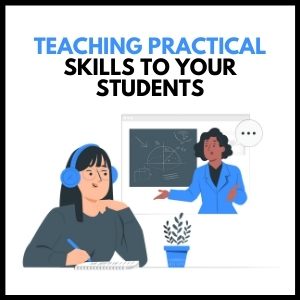College education has become more expensive than ever before. The average student debt of a college graduate in the United States is as high as $37,172, up by $20,000 since 13 years ago.
It’s the same in India and other countries, where parents spend their lifetime savings on their kids’ education. The question is, are the kids getting the right kind of education? Does college education equip you for the real world?
Evidently not.
One of the biggest reasons why the online courses at SKILLFIN LEARNING are in such high demand is because they equip learners with practical skills that they are not taught in high school or college.
That is why most of our online learners are young men and women – college students, recent graduates and young professionals. We find that both school and college education in almost every country around the world are lacking in 4 critical aspects.
They don’t teach students practical skills that are so important in the real world such as
- Financial Literacy
- Emotional Intelligence
- Career Planning
- Essential Life Skills
It’s very hard to get a job if you lack in any of these skills, and even if you do, you will not last long if you fail to pick up these skills later.
Companies such as Google and Apple no longer require applicants for jobs to be college graduates. But what they expect is that anyone who applies for a job with them has the relevant industry specific skills – whether it’s coding or data analysis.
At SKILLFIN LEARNING, we have a strong focus on equipping people with critical Data Analysis, Financial Analysis and Accounting, Finance and Business Valuation Concepts, so that they can successfully apply for data analyst jobs, financial analyst jobs and so on.
We are also keenly aware that most young people – especially those from non-financial backgrounds – are deficient in financial literacy. That could be the reason why so many young people make such poor financial decisions throughout their lives.
How else can you explain why the average credit card debt in the United States in as high as $7,000? Did you know 25 percent of households in the USA have a negative net worth – more debt than assets?
What’s more – 40 percent of households in the United States have a negative net pre-tax income of $11,660 a year. Shocking indeed, if this is the situation in the richest country in the world.
The problem is people don’t change – they do the same mistakes they made at a young age. So when students are not trained in practical, real world skills, it’s highly unlikely that they are going to pick them up when they are in their 30s or 40s.
That is why, if you’re a teacher or a professor, it is important that you initiate your students into online learning, so that they pick up critical life skills. Financial literacy is one such skill they have to learn, so that they are equipped to make the right decisions.
At SKILLFIN LEARNING, we have an excellent online course for those with a non-finance background: Finance Skills for Non-Finance professionals. It’s like a mini-MBA in Finance where students learn the fundamental concepts of Finance, Accounting and Business Valuation that will help them at any job in the future.
P.S. You will need to be logged in to provide your comments




22 thoughts on “Teaching Practical Skills to Your Students: A Comprehensive Guide”
… [Trackback]
[…] Info to that Topic: skillfine.com/teaching-practical-skills-to-your-students-guide-principles-strategies/ […]
… [Trackback]
[…] Information to that Topic: skillfine.com/teaching-practical-skills-to-your-students-guide-principles-strategies/ […]
… [Trackback]
[…] There you will find 93988 additional Info to that Topic: skillfine.com/teaching-practical-skills-to-your-students-guide-principles-strategies/ […]
… [Trackback]
[…] Information on that Topic: skillfine.com/teaching-practical-skills-to-your-students-guide-principles-strategies/ […]
… [Trackback]
[…] Information on that Topic: skillfine.com/teaching-practical-skills-to-your-students-guide-principles-strategies/ […]
… [Trackback]
[…] Read More on that Topic: skillfine.com/teaching-practical-skills-to-your-students-guide-principles-strategies/ […]
… [Trackback]
[…] Read More on to that Topic: skillfine.com/teaching-practical-skills-to-your-students-guide-principles-strategies/ […]
… [Trackback]
[…] Read More Information here on that Topic: skillfine.com/teaching-practical-skills-to-your-students-guide-principles-strategies/ […]
… [Trackback]
[…] Find More on to that Topic: skillfine.com/teaching-practical-skills-to-your-students-guide-principles-strategies/ […]
… [Trackback]
[…] Find More Info here on that Topic: skillfine.com/teaching-practical-skills-to-your-students-guide-principles-strategies/ […]
… [Trackback]
[…] Find More on that Topic: skillfine.com/teaching-practical-skills-to-your-students-guide-principles-strategies/ […]
… [Trackback]
[…] Find More Info here to that Topic: skillfine.com/teaching-practical-skills-to-your-students-guide-principles-strategies/ […]
… [Trackback]
[…] Information on that Topic: skillfine.com/teaching-practical-skills-to-your-students-guide-principles-strategies/ […]
… [Trackback]
[…] Find More here to that Topic: skillfine.com/teaching-practical-skills-to-your-students-guide-principles-strategies/ […]
… [Trackback]
[…] Read More on to that Topic: skillfine.com/teaching-practical-skills-to-your-students-guide-principles-strategies/ […]
Your article helped me a lot, is there any more related content? Thanks!
796602 546139I really like reading by means of and I believe this internet site got some genuinely utilitarian stuff on it! . 115238
652711 478041I got what you intend,bookmarked , extremely decent internet website . 965194
981775 243286Wow ~ Excellent stuff ~ Come and look at MY ?? 590580
776153 787631I simply need to tell you which you have written an excellent and exclusive write-up that I really enjoyed reading. Im fascinated by how well you laid out your material and presented your views. Thank you. 595789
Your point of view caught my eye and was very interesting. Thanks. I have a question for you.
140683 314062Hey there! Someone in my Myspace group shared this site with us so I came to take a look. Im definitely enjoying the info. Im bookmarking and will probably be tweeting this to my followers! Superb blog and outstanding style and style. 831802